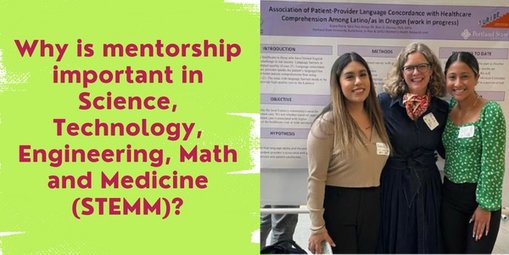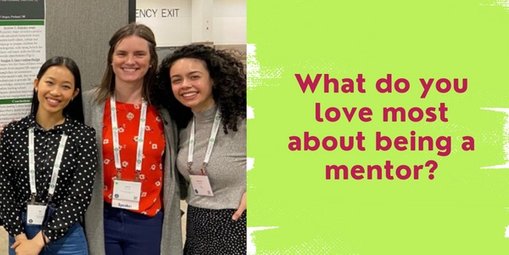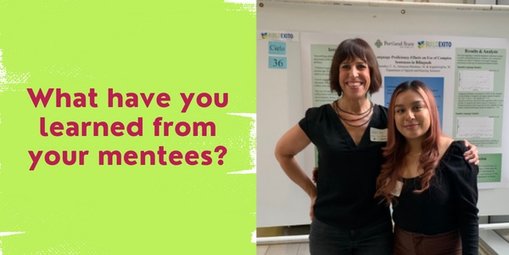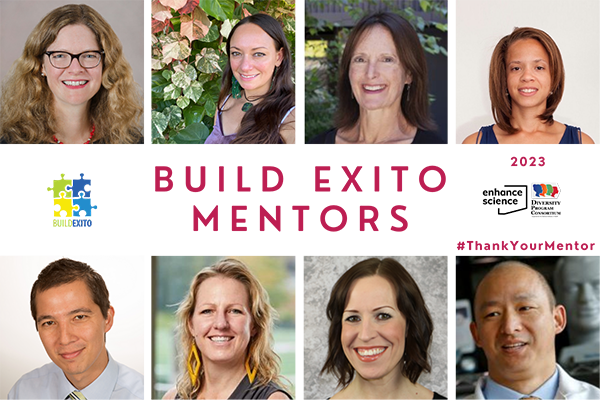
Consortium News
PSU BUILD EXITO mentors share perspectives for mentoring month
By Arjun Viray
Undergraduate scholars in Portland State University’s BUILD EXITO program submitted thank you notes to their mentors in celebration of National Mentoring Month (view here) in January.
Types of mentors that BUILD EXITO scholars have in their network include:
- Research mentors help students to develop research knowledge and skills while making meaningful contributions to research projects in long-term placements in Research Learning Communities
- Career mentors are faculty members who offer advice on academic and career planning and goal setting throughout the students’ time with EXITO
- Peer mentors are advanced students who facilitate connections to campus and help students navigate the student experience (oftentimes, these are alumni EXITO scholars!)
Through these different mentorships, BUILD EXITO aims to provide multiple support systems for students from traditionally underrepresented backgrounds.
Seven BUILD EXITO mentors participated in National Mentoring Month by sharing their thoughts on why mentorship is important, what they love about being a mentor and what they have learned from their mentees.
Read what Blair Darney, PhD, MPH; Alan Teo, MD, MS; Shandee Dixon, PhD; Nicole Bowles, PhD; Dara Shifrer, PhD; Derek Lam, MD, MPH; and Jennifer Blakeslee, PhD, had to say.

From left: Nancy Ledezma-Meza (scholar), Blair Darney (research mentor) and Grace Parra (scholar)
- Blair Darney — “Mentorship is important in every part of life! It may be even more important in STEMM where the barriers to entry can be large and the culture exclusionary and lacking in transparency.”
- Shandee Dixon — “As a first generation college student, I struggled with finding the opportunities that were available to me and always felt like I was behind somehow and should already know these things. Now, as a mentor myself, I think it is so important to offer support, resources and advice on navigating challenges, developing skills and offer insight into the multitude of career paths and opportunities available. Mentors are key in helping students navigate their journeys and also revealing the implicit or hidden knowledge, values and skills necessary for academic and professional success, including overcoming challenges and building confidence. These are far too often unspoken, but have a significant impact on student outcomes.”
- Alan Teo — “Being a mentor gives me a great opportunity to show my mentee what conducting science looks like at the ground level.”
- Nicole Bowles — “Navigating academia is not easy. I want to provide opportunities for discovery but also share the knowledge and skills that I have learned over the years to the next round of researchers.”
- Dara Shifrer — “Mentorship in STEMM is important because a sense of belonging and personally identifying with the subject/task are key predictors of academic success and persistence. Students from social groups who are well represented in STEMM fields will inherently feel more belonging and identification with STEMM subjects, whereas students from social groups who are underrepresented in STEMM fields benefit from extra attention and support.”
- Derek Lam — “As in most professional fields, mentorship is critical, but particularly in STEMM fields where the background knowledge and technical expertise can seem so overwhelming for someone who is just starting out. And if you don’t have family members or other role models in your life, your mentors may be the only window into what a career in this field looks like. So many of our choices about job and career are heavily influenced by the mentors we had along the way.”
- Jennifer Blakeslee — “I think it can be easy to feel like an imposter in STEMM fields, partly because of the complex nature of every discipline, topic and subtopic. Even if you're a dedicated student who keeps up with course content pretty well, there's always a new concept or technique or detail to learn, and that can feel overwhelming sometimes. Where mentoring comes in is to normalize that tendency, so that it doesn't feel so much like an individual student challenge, but more a reflection of what most people feel. For students from underrepresented backgrounds, that feeling can be even stronger, where you're maybe not sure if you belong in college at all, much less in a STEMM field. Again, that's where mentoring can be so important, just to explain the little things about science or academics or career paths that most students wouldn't be very familiar with. I think mentors can also be an important cheerleader [because] as a mentor, we can often see student's accomplishments and potential so clearly where they can't see it yet themselves, and where they may not have other people in their lives who are familiar enough with higher education (or specifically STEMM) to fully celebrate and reflect that potential back to the student.”

Nhi Dinh (scholar at left) and two unknown students
- Dixon — “I love being a mentor because it allows me to make a positive impact on someone's future. It's a great feeling to be able to share my knowledge and lived experiences to help students navigate the university system, feel confident in their abilities and celebrate their accomplishments! Building relationships and watching students grow and take initiative to achieve their goals is the most rewarding part of being a mentor and the most meaningful part of the work I do; I feel honored to meet and learn from such amazing people.”
- Teo — “Mentorship gives me a chance to help generate excitement about conducting health research. Building our next generation of researchers is so critical!”
- Darney — “My mentees give me energy and the hope that we can, and will, make progress towards a more just world.”
- Bowles — “Seeing my mentees present. Presentations are generally the most daunting part for most mentees, but it is always beautiful to see them put together a story, place their data in context of the larger picture and slowly tackle that imposter syndrome.”
- Shifrer — “I love witnessing a mentee realize that they can do statistics and can successfully manage and clean giant datasets.”
- Lam — “Seeing my mentees learn and develop new skills and confidence. That part is really gratifying. Things don’t always pan out in terms of the project they’re working on, but when they do, they are able to produce something tangible like a poster or a manuscript and they have an opportunity to present at a big meeting. That’s just such a great experience for them. It’s fun to see and experience with them.”
- Blakeslee — “I feel so lucky to have had the chance to get to know so many undergraduates who have backgrounds that may be different from mine, but with whom I share the experience of managing the challenges of higher education. I don't think my mentees know what a bright spot they often are in my day, where I can set aside datasets and journal articles and project timelines, and instead just focus on getting to know their aspirations and identity well enough to be able to support them in their goals and to help them problem-solve the inevitable bumps in the road along the way. Mentoring has offered so many moments of joy where sharing an insight or knowledge from my own academic journey, or just celebrating a student's accomplishments, can make a difference in their day and make them feel more confident heading into their next exam or term or program.”

From left: Jennifer Blakeslee (research mentor) and Cielo Hernandez Sanchez (scholar)
- Dixon — “As a mentor, I've learned that my role is not only about sharing my knowledge and experience, but also about truly listening to my mentees' thoughts and suggestions on making the academic environment more inclusive and accessible to the resources they need to succeed. Through meaningful conversations with my mentees, I have had the opportunity to expand my own knowledge, learn about new trends and developments, and get exposed to new technologies and approaches through the amazing work they are doing. My mentees also bring unique perspectives and challenge my own assumptions, providing me with fresh ideas and growth opportunities for myself as well. Mentorship is a mutually beneficial relationship where my mentees and I can grow and learn from each other, leading to personal and professional growth for both of us!”
- Darney — “I have learned so much about my own gaps in understanding, which has helped to continue to evolve as a scientist and a leader. This has been a gift.”
- Bowles — “My mentees bring a wealth of knowledge in so many different areas including graphic design that has taken my dissemination materials to a higher level, book recommendations, and new foods and beverages (mushroom cola has been my favorite).”
- Shifrer — “I have learned to be more brave, to take more chances and to persevere with resilience and faith.”
- Lam — “Being a mentor can be really challenging. Different mentees show up with different levels of training and experience, and everybody has different strengths and weaknesses. Figuring that part out and figuring out a good project for them to work on that is challenging, but also doable and can help build confidence, is the toughest part as a mentor. Although we are often expected to know how to be good mentors based on our past experiences with our own mentors, it is a learned skill and some people are better at it than others. Just as I am continuously learning how to be better at other aspects of my job, as a physician [and] as a researcher, in the same way I am always trying to be better as a mentor also. So just as my patients have taught me how to be a better physician, my mentees are also teaching me how to be a better mentor. It’s really a bi-directional learning relationship.”
- Blakeslee — “I think I've learned that there's no one way to support a student, and that not every mentoring relationship is going to be immediately productive or impactful. But there's always something to be gained by the mentor and mentee, even if it doesn't feel like a perfect match at first, because sometimes learning how to connect and learn from each other may be the biggest takeaway from the relationship. Looking back, I would say that the times where a mentee and I both had to work a little harder to understand each other were some of the most meaningful and memorable mentoring relationships I've had, and they're ones where I felt like I grew the most and became a better mentor overall.”

Top row (from left): Blair Darney, Shandee Dixon, Belinda Zeidler, Nicole Bowles.
Bottom row (from left): Alan Teo, Dara Shifrer, Jennifer Blakeslee, Derek Lam.
About the mentors:
- Blair Darney, PhD, MPH — Research assesses access to and utilization of reproductive health services, adolescent pregnancy, and maternal health in Mexico and the US.
- Alan Teo, MD, MS — Research focuses on the role of social relationships in influencing mental health outcomes.
- Shandee Dixon, PhD — As a scientist at the OHSU Cancer Early Detection Advanced Research Center (CEDAR) she founded the CEDAR Health Inequities Committee focused on building awareness around the impact systemic health inequities have on early detection and treatment of cancers.
- Nicole Bowles, PhD — Research laboratory examines the role of cannabinoid signaling in the modulation of sleep and circadian rhythms, and how these signaling patterns buffer the cardiometabolic responses to psychosocial and environmental stress.
- Dara Shifrer, PhD — Research focuses on how inequality outside of schools interacts with processes inside schools to shape educational and health outcomes.
- Derek Lam, MD, MPH — Researches the diagnosis and treatment of obstructive sleep apnea in children.
- Jennifer Blakeslee, PhD — Researches services to improve outcomes for youth in foster care, especially related to mental health and substance use, social development, and overall well-being.
The Coordination and Evaluation Center at UCLA is supported under award number U54GM119024.

Grow Together.
